Crew cabins on cruise ships vary by size and mainly depend on the job position, rank or title you have as a crew member. Crew cabins’ appearance also varies from ship to ship. Older cruise ships’ crew cabins are usually old and used, while newly built ships feature prettier and more comfortable cabins for their employees.
In this article, I want to give you an overview of crew cabins so you can get familiarized with life at sea.
Crew Cabins’ Size
As mentioned above, cruise ship crew cabins vary by size which is mainly determined by your rank or title onboard.
Most of the crew members have double-shared cabins, meaning that they need to share a cabin with someone else. It is normally the person of the same sex and from the same or similar department. For instance, I’ve worked as a Shore excursion staff, and almost always I shared my cabin with my coworker from the same department. Crew members from the same departments normally have cabins close to each other, and close to their workplace (in my case, crew cabins were near our Shore excursions office).
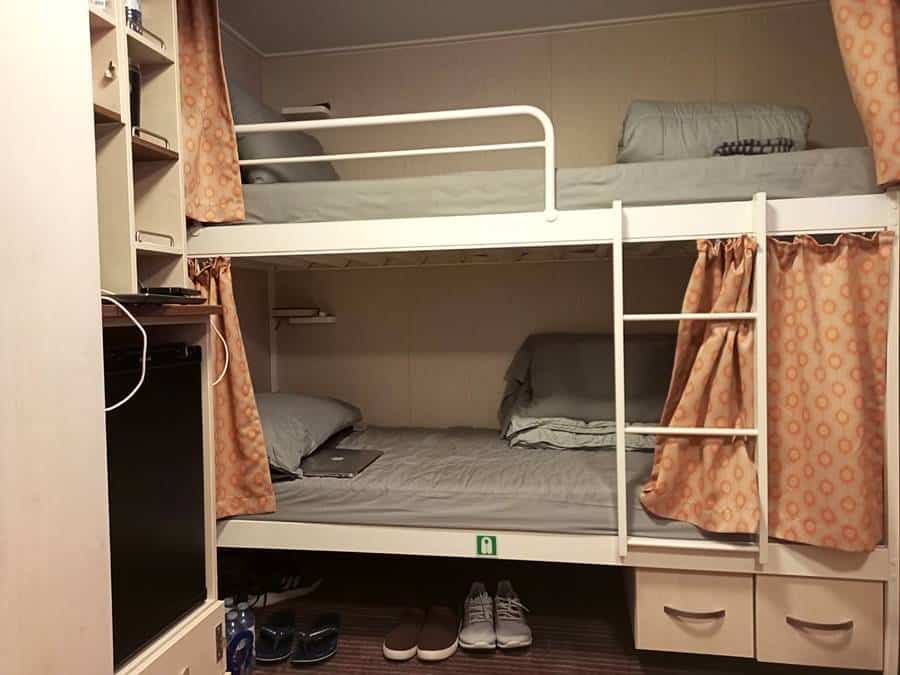
If you are friends with someone or you want to live with a particular person, you can request to live together. The crew HR department will then consider your request and accommodate you based on the vacancy.
If you have a partner onboard, you can also request to live together which is approved in most cases (again, based on the vacancy and your status/job positions).
Double-shared cabins are in most cases very tiny and they don’t have portholes (windows). Each crew cabin is equipped with its own bathroom, which is also very small. Crew members living in these cabins are responsible for cleaning their cabins regularly by themselves.
There is a cabin inspection on a regular basis led by designated officers from higher positions and different departments, so they can check if your cabin is maintained and regularly cleaned. You can borrow the cleaning products from the Housekeeping department or Laundry, but I always preferred to have my own products that I would buy in a crew shop (yes, we do have one!) or outside in the port.
Officers, managers and supervisors in higher positions normally have single cabins, which means they don’t have to share with another crew member. These cabins are slightly bigger (but not necessarily more luxurious), they have a porthole (window) and a larger, full-size bed. Some single cabins also have an additional fold-down bed. They have their own bathroom (equally small) and daily housekeeping service, which is one of the best perks.
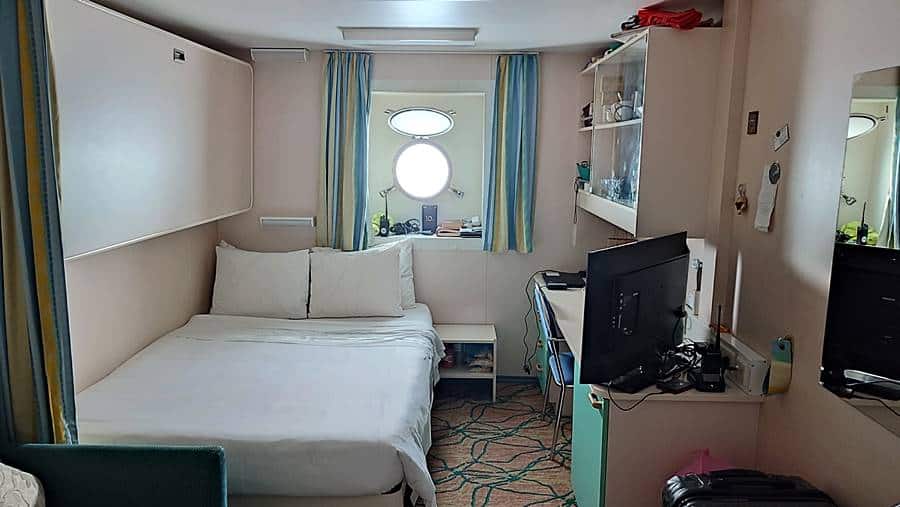
Single cabins are usually given to the officers with 2.5 stripes and above (stripes worn on officers’ shoulders denote their rank on the ship). The higher your position is, the better your living space is. For example, Captain, Staff Captain, Chief Engineer have 4 stripes and their cabins are on deck 10 near the Bridge, so their cabins are of the same size as guest cabins on that floor. Some of these cabins even consist of two rooms. However, this widely varies by company and depends on the ship itself.
What’s Inside Crew Cabins?
Crew Cabins are equipped with the following:
- Bunk beds/full-size beds – Standard double-shared cabins have bunk beds with privacy curtains and a ladder. If you came to the cabin first, you are most likely to claim the bottom bed (crew members’ preference), while newcomers don’t have other choices but to take the top bunk.
Once you move in, you will be provided with clean sheets and a pillowcase (clean, but not necessarily new). However, I always used to bring my own sheets because I wanted to have a little piece of home with me. I always used to bring old sheets, so I could toss them away after I finish my contract and not overload my luggage with it. Underneath the bed, there is enough space to store two suitcases of large/medium size, and this is where the crew keeps their luggage.
Each bunk has a lamp so you can read if you want, and some even have their own flat-screen TV installed (this varies by company and only applies to newer or refurbished ships).
As I said before, officers with 2.5 stripes and above have single cabins with one larger bed (two people can easily fit) and an extra foldable bed.
- The bathrooms are really tiny and they consist of a shower cubicle, a toilet, a small sink, and a few shelves where you can put your products. Make sure you organize your space smartly, or otherwise you won’t have enough space to fit your stuff. For the bathroom, I definitely recommend you get a foldable toiletry bag, it’s extremely useful and you can hang it over the door.
I share some useful tips in my article 18 Crew Cabins Must-Haves, so I hope they make your onboard life easier!
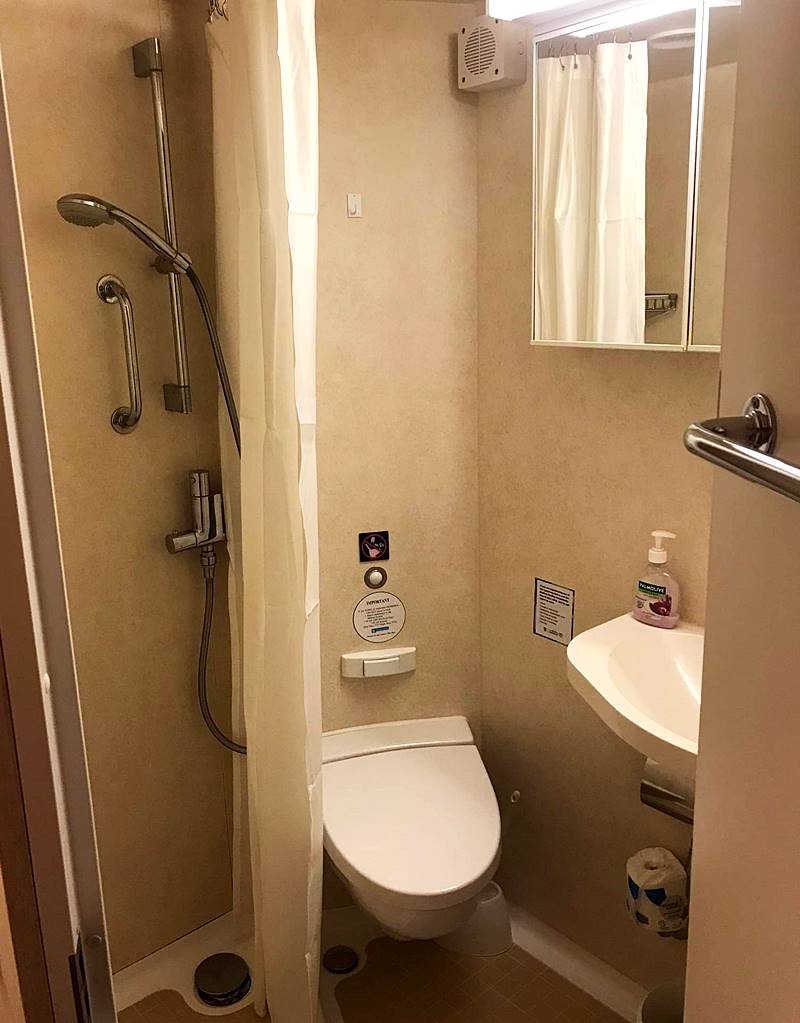
You can take the toilet paper and ship approved cleaning chemicals from the Laundry for free, however, you can also purchase your own products as well. Crew members have their own laundry where they can wash their stuff for free, but they need to use their own detergent and softener. You can buy all of this in a slop chest (a crew shop) that every ship has for their crew.
- A closet – Every crew cabin is equipped with a medium-sized closet with shelves and drawers that you share with your roommate (for double-shared cabins). The space is extremely limited, so if you are planning to keep it tidy, make sure you bring only the essentials.
A hanging shoe organizer is an amazing item that I highly recommend, as well as a mesh pop-up laundry basket where you can dispose of your dirty laundry.
On top of the closet, there’s space for two life jackets. It’s mandatory for every crew member to keep their life jackets in their cabins and use them during the drills or in case of an emergency.
- A small desk with a chair – Due to the size of a standard crew cabin, only one chair can fit but you can always get an extra one if you need it.
- A mini-fridge – You’ll find a mini-fridge in every crew cabin. Here, you can keep your drinks or snacks. Keeping fruits and vegetables in the fridge is normally not allowed on most ships.
- TV and Phone
- Safe boxes
- A large mirror
- A trash can – Crew members are required to sort their own trash. We are required to bring our garbage to the incinerator room where we separate glass, paper, metal into the designated bins.
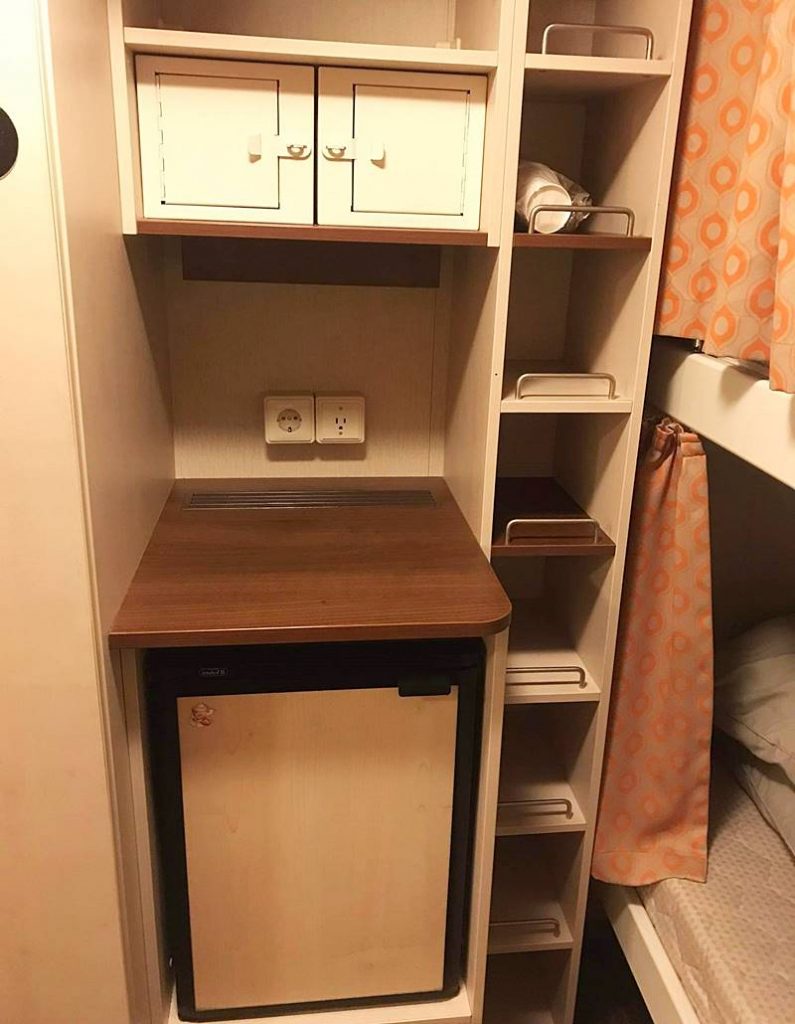
Crew Cabins Location
Crew cabins are located on several decks, from deck zero (below sea level) to deck 2 or 3, with the exception of bridge officers who live higher up closer to the Bridge and their workplace.
The location depends on your job position and the workplace. For example, the majority of restaurant and bar staff normally live on deck zero close to the crew elevators that can bring them fast to their workplace (bars, galleys, a dining room, restaurants). Officers and managers who have single cabins are usually situated on decks 1 or 2 on the port side and starboard side, as they have portholes and windows.
Life inside the Crew Cabins
- A tiny crew cabin is your new home for the next several months, so always keep it clean and tidy.
- Get along with your roommate! After all, that’s the person you share your life with, so always be considerate regarding his/her working hours, shifts, needs, and habits (don’t slam the doors, don’t be noisy, don’t turn on the light in the middle of the night, etc.)
- I recommend you only bring the essentials, as the space is extremely limited and you will be buying new stuff onboard a ship and outside in ports (trust me!). Here is my list of 18 Crew Cabins Must-Haves!
- It’s forbidden to smoke inside the crew cabins. There are designated areas onboard the cruise ship where smoking is allowed (such as crew open decks).
- You can’t keep electrical appliances in your cabin (kettles, irons, etc.). Fruits, vegetables, fresh food are normally not allowed to be kept in the fridge.
- You are responsible for changing your bedsheets and linen. You can discharge the dirty/get clean ones in the laundry. You can use the ship towels for free during the entire duration of your contract.
- Cabin inspections are mandatory, so make sure you keep your cabin clean and according to the ship’s standards.
- Respect your roommate’s privacy and don’t invite other crew members inside your cabin if your roommate disapproves of it.
- You are responsible for any valuable items/credit cards/money you may have. Always keep an eye on your belongings. Some ships have safety lockers available.
- If you don’t get along with your roommate, you can always report it to the HR department and they will do their best to accommodate your request and move you to another cabin.
Wrapping Up
Life inside cruise ship crew cabins is unique, extraordinary, unconventional experience! Your life suddenly needs to fit in a few square meters for over half a year, not to mention that you need to share that space with a person you (most often) don’t know! It’s fun, challenging and tough at the same time, but definitely an experience that you will remember for a lifetime!
Read more about crew ship life:
Working on Cruise Ships: How to Apply for a Cruise Ship Job?
Food and Beverage Department – Working as a Cruise Ship Waiter?
10 Things to Know before Applying for Cruise Ship Job
Security Jobs onboard Cruise Ships – What You Need to Know
11 Things You Would Never Expect to Be Part of Your Cruise Ship Job
New Hire? This is How Your First Day on a Cruise Ship Looks Like
Life Onboard a Cruise Ship: 18 Crew Cabins Must-Haves
Life of a Cruise Ship Photographer – Crew Member’s Story
Working as a Guest Services Representative on a Cruise Ship
This article may contain Amazon affiliate / compensated links. For full information, please see my disclaimer here.



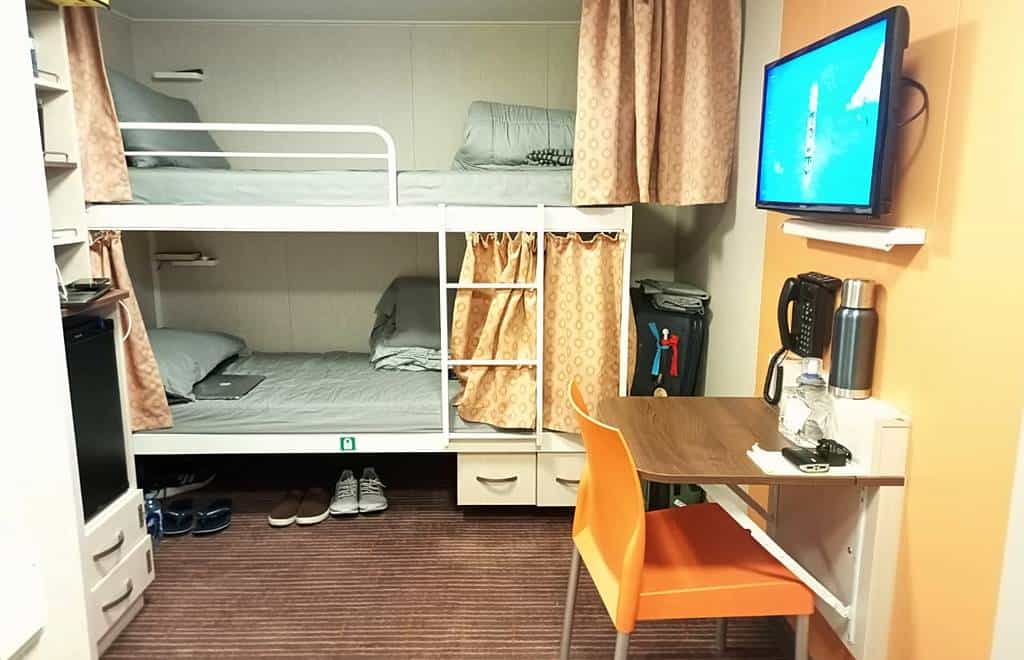


Pingback: Cruise Ship Job: Doctor | The Crew Hangout
Pingback: Find Financial Relief with 14 Jobs That Provide Housing